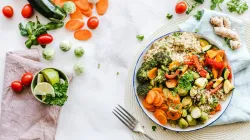What is 'Plant based diet'? Know all about this sustainable and organic meal
Plant based diet is a healthy alternative to processed animal foods and has various health and environmental benefits. Read more to see how this diet can benefit you and what makes it different from a vegan or vegetarian diet.

2024 is the year for trying something new - be it fashion, music or even your daily dietary choices. Plant-based diets are becoming increasingly popular, known for its environmental and health benefits. Here’s everything you need to know about getting your daily intake of plant-based protein, muscle-building compounds, energy boosters and every nutrient you’ll need to stay fit- 100% organic.
What is a plant-based diet?
A plant-based diet is a sustainable and healthy alternative to an animal-based diet and focuses mostly only on foods derived from plants. This includes fruits, vegetables, nuts, seeds, legumes, oils and other natural products. Often confused with a vegan or vegetarian diet, the diet does not limit consumption of non-plant-based products but rather proportionately encourages consumption so that primary food consumption focuses on plant-based foods instead. Typically, those who follow a plant-based diet tend to avoid refined foods such as added sugars, processed oils and artificially processed white flour. This dietary choice aims to promote locally sourced organic food in an individual’s diet, aiming to encourage sustainable and healthy eating.
Health benefits of a plant-based diet
Sustainable- Plant-based foods consume less energy to be made and do not harm the environment in the same way that animal-based foods do. Not only does it protect the lives of animals but also contributes to less emissions in the environment.
Healthy- Due to most plant-based foods being organic, they do not contribute as significantly to the increase in cholesterol or sugar in the bloodstream and help sustain a healthy body.
Affordable- Plant-based recipes are rather simple, easy to source and affordable compared to meat-based products. This makes it a financially sustainable alternative as well.
So what about protein?
A common dietary misconception is that protein is exclusively derived from animal meats such as fish, chicken, lamb etc. However, that is not true as protein is present in several soy-based products such as tofu, edamame and tempeh, which are among the richest sources of protein. Additionally, peanuts, almonds, quinoa and vegetables such as lentils, chickpeas etc. are also filled with large amounts of protein.
If you wish to cleanse your body of artificially processed foods and switch to a long-term, sustainable alternative, try following a plant-based diet and reap its health and environmental benefits.